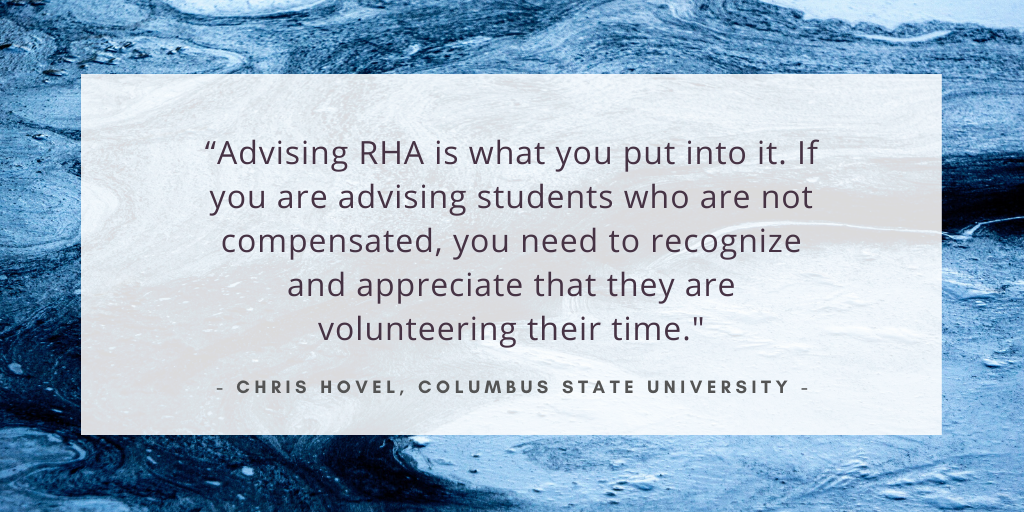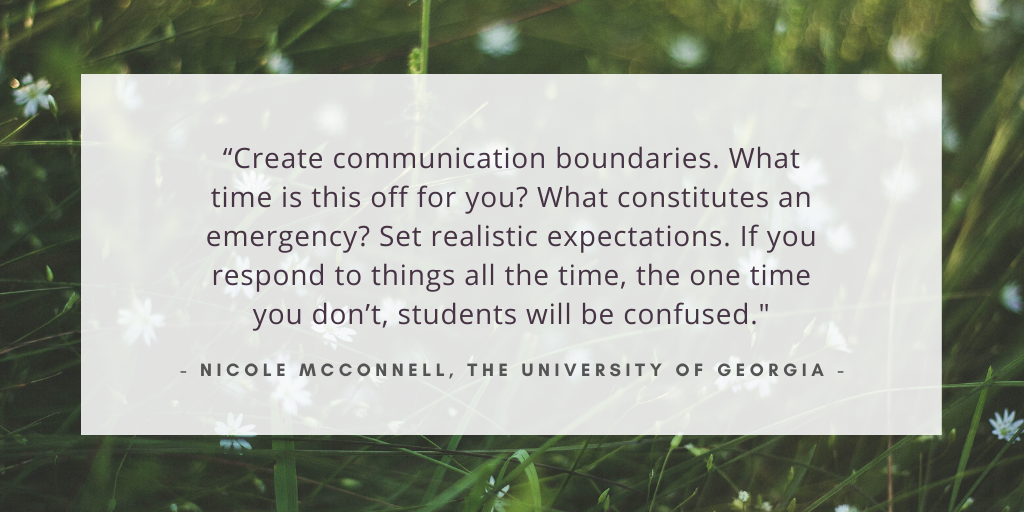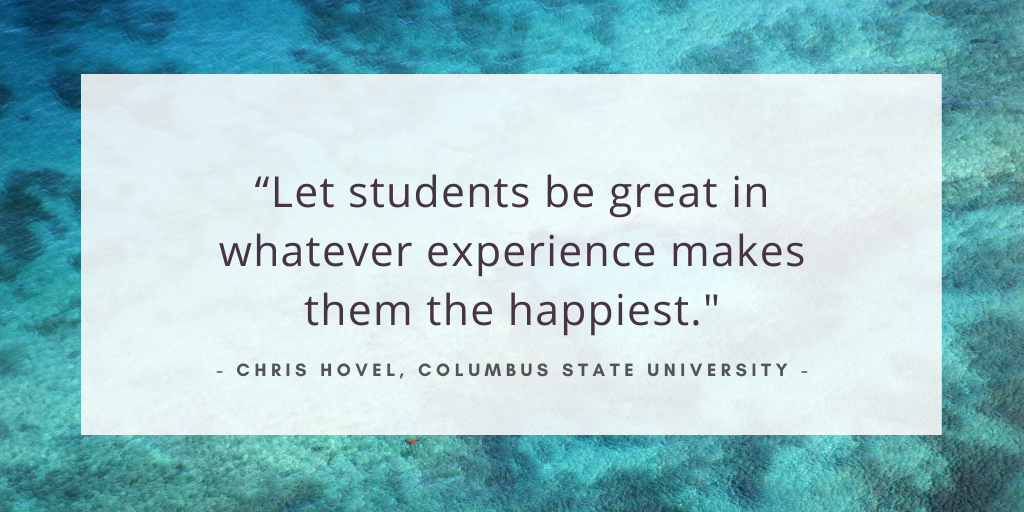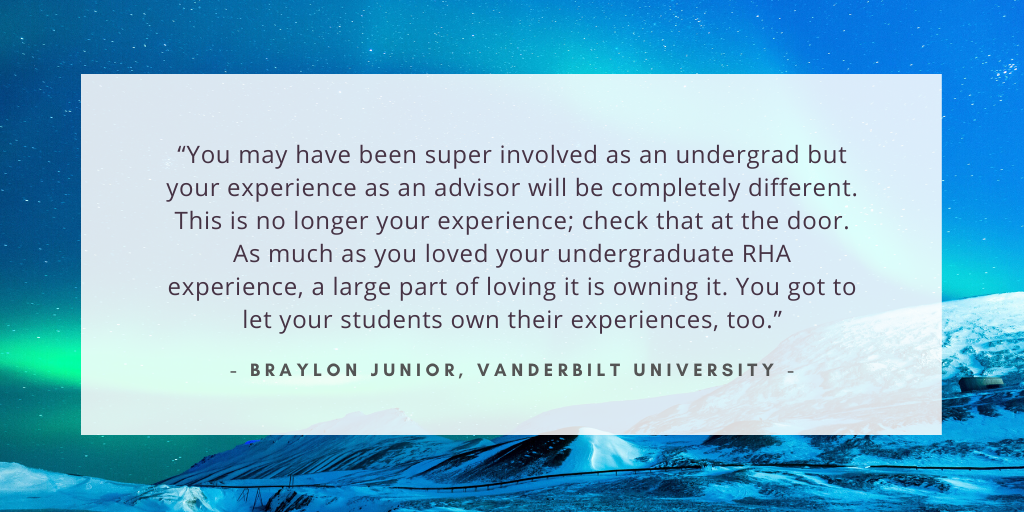The life of a hall director is one of many hats: Supervising resident assistants and (sometimes) grad assistants, overseeing the daily facilities and maintenance of buildings, adjudicating student conduct cases, and lots and lots of programming.
But there is another aspect of the hall director role that folx may not know much about: Advising a Residence Hall Association.
Advising is fundamentally different than supervising. RHA members are volunteering their time, often without any monetary compensation. Advising RHA means advising a group of students who are passionate about where they live and who want to be hands-on in creating their community.
I spoke with five former and current RHA advisors to share their top tips for success. From large four-year institutions to smaller liberal arts colleges, these student affairs professionals loved their time with RHAs and learned a lot in the process.
If you have been thinking about advising an RHA or are new to the advisor role, here are eight tips to make the most out of your experience, according to five awesome people who’ve done it before.
8 Tips
1. Be hands-off
RHAs do not function like most other campus groups. Everything about RHA is run by students — from each on-campus RHA group, all the way up to regional and national governing bodies.
With RHA functioning more autonomously than other groups, advisors need to be able to provide support without imposing ideas or providing instructions. All of my interviewees were quick to remind me that advising is not the same as supervising. In order to be a good advisor, you have to let people make their own mistakes.
“With supervising, you can hold people more accountable because of job expectations. But with advising, you are literally just giving advice on what they could do or what you think they should do. If they don’t do it or if they don’t meet expectations, you’re going to be frustrated but you have to be okay with that.”
— Amber Hurt, Hofstra University
It’s not always easy watching your students make decisions that you wouldn’t have made. But you are providing them a safe space to ideate, execute, succeed, and fail forward.

2. Get organized
When you first start a new RHA advisor role, you may not be handed any transitional documents or historical records to help you do your job well.
So, you will need to figure out how to get organized in a way that works for you. Start by asking yourself some quick inventory questions.
Do you have:
- a constitution?
- bylaws?
- a list of active members?
- financial records or previous budgets?
Take account of what you have, what needs to be created, and how you are going to store all of this information from year to year.
Two of my interviewees said that their institutions utilized GoogleDrive for all their record-keeping, but file sharing and administrative housekeeping will vary by school.
Also, consider how you are going to communicate important information with your RHA members. Will you only communicate via email or are you open to a mobile group messenger? How are you going to set up and keep track of all of your meetings?
Thankfully, there are numerous digital tools out there that can help you and your RHA members get your administrative lives together.
3. Show recognition
RHA members are typically among the institution’s most engaged students. Be mindful of how high-touch these student leaders are and consider how you can reaffirm their contributions throughout the year.
Everyone is different in how they show or give appreciation. So whether it’s a quick poll during a group meeting or a long discussion during a one-on-one discussion, ask your RHA members, “how do you prefer to be appreciated?”
Some students will appreciate public verbal praise while others will prefer a handwritten card. For others, free candy and food will always be the best way to say thanks. Whatever the gesture is, it is important to personalize your gratitude for each student.

4. Attend conferences
Conferences are a great way to continuously learn and build skills within the RHA advisor role.
NACURH offers a training program at their annual national conference (and at all eight of their regional conferences) called ART: Advisor Resource Training Program. The 29-session curriculum covers a variety of topics that advisors can expect to encounter.
Conferences also provide excellent professional networking opportunities. Whether you are interested in advancing your residence life career or exploring openings for your next position, conferences can connect you to resources and people willing to help.
“Create community with other advisors when you are at conferences. It is okay to separate from your students during that time. [The students] can do their own thing.”
– Nicole McConnell, The University of Georgia
Advisors from all over the state or country will be at these conferences. Don’t be afraid to grab coffee or lunch with folx and get to know them. Hanging out with other advisors is a great way to provide mutual support, share best practices, or simply give each other during much-needed breaks from the packed schedule.
5. Be supportive and set boundaries
Advising students is a lot of work.
Empower your students to not need you. Ask yourself: Do I actually need to be at every general body meeting? Perhaps your time will be better utilized at executive board meetings only.
Also, do you need to have one-on-one meetings with every RHA member or can you delegate some meetings to the executive board?
Figure out what works for you and your students. Remember, you are here to advise, not supervise. The advisors I spoke with agree that setting realistic expectations from the beginning of your relationship will help reinforce the boundaries between your personal time and professional time.

In addition to setting boundaries with your students, you also have to set up boundaries for yourself. Make sure your supervisor is on board with your role as an advisor and communicate what kind of support you need from them.
“Talk to your department and make sure they recognize the time commitment, duties, and responsibilities that RHA demands in addition to your regular role as an RD. The whole department has to understand the late-night hours and advisors need to have access to flex time.”
— Braylon Junior, Vanderbilt University
6. Keep your RHAs and RAs separate
One thing that makes RHAs so exciting to advise is that it gives you new insight into the residential story.
RHA members are not only well connected; they also know the ins and outs of their communities. This means that they have a great pulse on the needs and wants of their peers.
However, this doesn’t mean that they need to be your next resident advisors. Becoming an RA requires a different set of responsibilities, including serving on-call, managing crises, and resolving roommate conflicts.
Just because a student leader is a relationship builder and awesome at programming, it doesn’t mean that they need to (or should) be an RA in the future.
“Stop treating your RHA like a vetting pool for your future RA staff members.”
– Chris Hovel, Columbus State University
RHA is a great leadership opportunity all on its own and offers plenty of transferrable skills, including:
- Creativity
- Collaboration
- Delegation
- Time management
- Budgeting
- Networking
- Innovation
- Decision making
- Advocacy
- Self-efficacy
Some RHA members may want to become RAs, and that’s totally fine. But recruiting residents to be in RHA members with the promise of future RA positions is not sustainable. Folx who engage in this practice will find their RHA organizations plagued with high turn-over and unstable leadership.

Being an RHA member or serving on the RHA executive board is a rewarding experience and is not second banana to being an RA.
7. Become financially fluent
Pay attention to your institution’s rules, policies, and procedures related to financials and procurement. Investigate the answers to these questions:
- What fees contribute to which funds?
- Which funds can be used to purchase food (versus supplies or entertainment)?
- How much do your resident fees contribute to RHA?
- Does this amount fluctuate depending on how many students sign up for housing?
- Does RHA have to purchase items with a purchase order or a university credit card?
- Does RHA have a contract approval process through the university?
- Are we allowed to raise money in other ways?
You should be able to get all these answers from your supervisor or your institution’s procurement office. While RHAs typically have the autonomy to make decisions in regards to their programmatic efforts, they may be limited in their purchasing powers.
“Think about how money works on your campus. This will help when you are trying to figure out how to spend money… and what you can spend it on, in regards to food, conferences, swag, etc. Learn where the money is coming from.”
— Tim Leyson, Santa Clara University
8. Don’t let your experiences as a student cloud your judgment as an advisor
Similar to the hands-off tip, advising RHAs means you have to be hands-off while they create their own RHA experience.
Sometimes, intentionally or not, advisors try to recreate the things that made their own experiences so special. Whether it’s a specific program or leadership style or just providing too many suggestions, it’s unfair to self-impose your own experience onto your student leaders. We all have good intentions when it comes to advising our students, but it’s easy to get carried away with living vicariously through them.
In order to gain the transferable skills employers want, students must create their own experiences, learn from their failures, and be proud of their accomplishments. It’s time to pass the baton and let your students live their best RHA lives.

Being an RHA advisor is an amazing opportunity for so many reasons but one of the best reasons is witnessing student development first hand. There is nothing better than seeing someone go from a shy, unsure-of-themselves resident to a confident, capable-of-anything student leader.
If you have any tips for your fellow RHA advisors or have a fun story about an RHA student leader, we’d love to har it! Connect with us on Twitter at @themoderncampus and @Meg_Roll.





